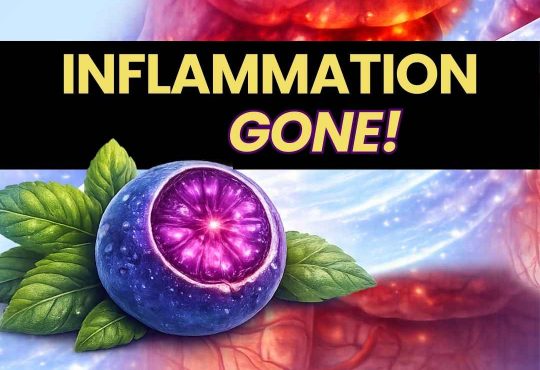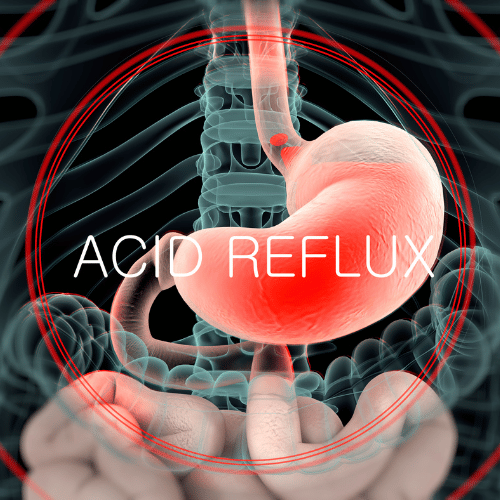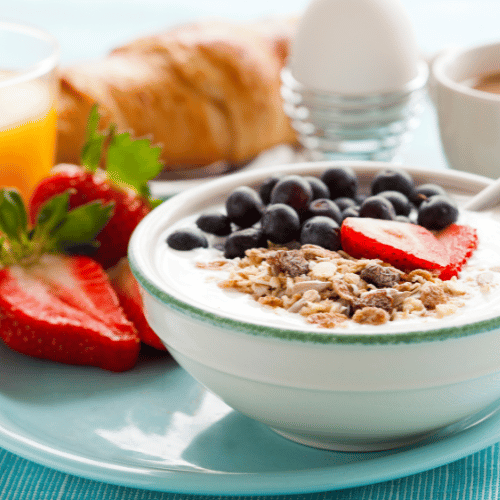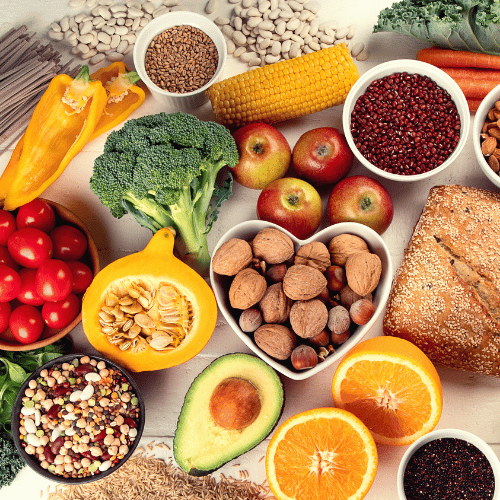
6 Yellow Foods To Prevent Bowel Cancer And Colon Polyps
Maintaining a healthy diet is crucial for preventing serious health issues, and the right foods can play a significant role in keeping your digestive system in top shape.
Yellow foods are not only vibrant and delicious but also packed with nutrients that can help reduce the risk of bowel cancer and colon polyps.
Stick around to learn which yellow foods should be on your plate to promote a healthier gut.
Let’s get started and discover the power of these yellow wonders!
6. Yellow Bell Peppers
Starting our countdown at number 6, yellow bell peppers are not just a colorful addition to your meals but also a powerhouse of nutrients.
These vibrant vegetables are packed with vitamins and minerals that offer numerous health benefits, particularly for your digestive system.
Yellow bell peppers are rich in vitamin C, providing more than 150% of your daily recommended intake in just one cup.
Vitamin C is a potent antioxidant that helps protect your cells from damage caused by free radicals, which can lead to cancer.
By neutralizing these harmful molecules, vitamin C reduces oxidative stress and inflammation, both of which are linked to the development of bowel cancer and colon polyps.
In addition to vitamin C, yellow bell peppers are an excellent source of vitamin A, specifically in the form of beta-carotene.
Beta-carotene is another powerful antioxidant that supports healthy vision, immune function, and skin health.
It also plays a role in reducing inflammation and maintaining the integrity of the mucous membranes in the digestive tract, providing an additional layer of protection against cancerous changes.
Yellow bell peppers are also high in dietary fiber, which is crucial for maintaining a healthy digestive system.
Fiber adds bulk to the stool, promoting regular bowel movements and preventing constipation.
This helps to keep the digestive tract clean and free of potential carcinogens.
Adequate fiber intake is associated with a lower risk of developing colorectal cancer, as it helps to reduce the time that harmful substances stay in contact with the colon lining.
Moreover, yellow bell peppers contain a variety of other beneficial compounds, such as flavonoids and carotenoids, which have anti-inflammatory and anti-cancer properties.
These compounds work together to support overall digestive health and reduce the risk of chronic diseases.
5. Yellow Kiwi
Next up at number 5 is yellow kiwi, also known as golden kiwi.
This vibrant fruit is not only delicious but also packed with nutrients that support digestive health and help prevent bowel cancer and colon polyps.
Yellow kiwi is particularly high in dietary fiber, which aids in digestion and helps to keep your bowel movements regular.
The high fiber content in yellow kiwi adds bulk to the stool, promoting regular bowel movements and preventing constipation.
This ensures that waste products and potential carcinogens are efficiently removed from the body, reducing the time they come into contact with the lining of the colon.
This reduces the risk of developing colon polyps and bowel cancer.
In addition to its high fiber content, yellow kiwi is packed with antioxidants such as vitamin C and vitamin E.
These antioxidants help protect cells from oxidative damage caused by free radicals.
Vitamin C supports the immune system and aids in the repair of tissues, including those in the digestive tract, while vitamin E helps maintain cell integrity and prevents damage to the cells’ DNA.
Yellow kiwi is also rich in actinidin, a natural enzyme that aids in the digestion of proteins.
Actinidin enhances the breakdown of protein-rich foods, making digestion more efficient and reducing the likelihood of digestive discomfort.
This enzyme, combined with the fruit’s high fiber content, makes yellow kiwi an excellent choice for promoting a healthy digestive system.
4. Yellow Squash
At number 4, we have yellow squash.
This versatile vegetable is a fantastic addition to any diet, offering numerous health benefits while being low in calories.
Yellow squash is particularly high in vitamins A and C, as well as dietary fiber, making it a powerful ally in maintaining a healthy digestive system and preventing the formation of colon polyps and bowel cancer.
Vitamin A in yellow squash comes in the form of beta-carotene, a potent antioxidant that supports immune function, eye health, and skin health.
It also plays a crucial role in maintaining the integrity of the mucous membranes in the digestive tract, providing a protective barrier against harmful pathogens and potential carcinogens.
Vitamin C, another antioxidant found abundantly in yellow squash, helps protect cells from oxidative damage caused by free radicals.
This vitamin is essential for collagen production, which supports the structure of the tissues in the digestive tract.
By reducing inflammation and oxidative stress, vitamin C helps lower the risk of developing chronic diseases, including bowel cancer.
The dietary fiber in yellow squash is key to promoting a healthy digestive system.
The fiber in yellow squash ensures that waste products and potential carcinogens are promptly eliminated from the body, reducing the risk of colon polyps and bowel cancer.
Fiber also helps maintain a healthy gut microbiome, which is important for overall digestive health.
You can add yellow squash to soups for extra nutrition and flavor, include it in stir-fries for a delightful crunch, or simply roast it with a drizzle of olive oil and your favorite herbs for a delicious side dish.
Its mild, slightly sweet flavor pairs well with a variety of dishes, making it a favorite among many.
3. Pineapple
Coming in at number 3 is pineapple.
This tropical fruit is not only sweet and delicious but also packed with essential nutrients that support digestive health and help prevent bowel cancer and colon polyps.
Pineapple is rich in vitamin C, bromelain, and dietary fiber, each of which plays a crucial role in maintaining a healthy digestive system.
Vitamin C is a powerful antioxidant that helps protect your cells from damage caused by free radicals.
It also supports immune function and aids in the repair and regeneration of tissues, including those in the digestive tract.
By reducing inflammation and oxidative stress, vitamin C helps lower the risk of developing chronic diseases, including bowel cancer.
Bromelain, an enzyme found in pineapple, has anti-inflammatory and digestive benefits.
Bromelain helps break down proteins in the digestive system, which can aid in digestion and reduce symptoms of bloating and indigestion.
Additionally, bromelain has been shown to reduce inflammation in the gut, which is important for preventing conditions that could lead to cancerous changes in the bowel.
Dietary fiber in pineapple promotes regular bowel movements by adding bulk to the stool, making it easier to pass and preventing constipation.
Regular bowel movements help ensure that waste products and potential carcinogens are quickly eliminated from the body, reducing the time they come into contact with the lining of the colon.
2. Turmeric
At number 2 is turmeric, a vibrant yellow spice renowned for its powerful anti-inflammatory and antioxidant properties.
The active compound in turmeric, curcumin, has been extensively studied for its potential to reduce the risk of various cancers, including bowel cancer.
Curcumin’s health benefits make turmeric an essential addition to a diet focused on preventing digestive issues and promoting overall health.
Curcumin, the main bioactive component of turmeric, has strong anti-inflammatory effects.
It works by inhibiting molecules in the body that cause inflammation, such as cytokines and enzymes.
Chronic inflammation is a known contributor to the development of cancer, and by reducing inflammation, curcumin can help lower the risk of cancerous changes in the cells of the digestive tract.
In addition to its anti-inflammatory properties, curcumin is also a potent antioxidant. It helps neutralize free radicals, which are unstable molecules that can damage cells and DNA.
This antioxidant activity protects the cells of the digestive tract from oxidative stress, which is a significant factor in the progression of bowel cancer and the formation of colon polyps.
A study published in Cancer Prevention Research found that curcumin can inhibit the proliferation of cancer cells and induce apoptosis (programmed cell death) in colorectal cancer cells.
These findings highlight the potential of turmeric as a natural preventative measure against bowel cancer.
Use turmeric to add a warm, earthy flavor to curries, soups, and stews.
Turmeric can also be used in marinades for meats and vegetables or added to rice and quinoa dishes for an extra boost of color and nutrition.
And for a soothing and healthful drink, try making a warm turmeric latte by mixing turmeric with milk or a dairy-free alternative, along with a touch of honey and a sprinkle of black pepper to enhance curcumin absorption.
1. Bananas
And topping our list at number 1 are bananas.
These versatile fruits are not only delicious and convenient but also packed with nutrients that support digestive health and help prevent bowel cancer and colon polyps.
Bananas are high in dietary fiber, particularly pectin, which plays a crucial role in regulating the digestive system and preventing constipation.
Pectin, a type of soluble fiber found in bananas, helps to absorb water in the digestive tract, forming a gel-like substance that can ease bowel movements and ensure regularity.
This is important for maintaining a healthy digestive system and reducing the risk of constipation, which can lead to the development of colon polyps and increase the risk of bowel cancer.
Like the other fruits on our list, bananas contain Vitamin C, a powerful antioxidant that helps protect cells from damage by neutralizing harmful free radicals.
It also supports the immune system and aids in the repair of tissues, including those in the digestive tract.
Vitamin B6 plays a vital role in numerous biochemical reactions in the body, including the metabolism of proteins and the production of neurotransmitters.
It helps maintain a healthy nervous system and supports immune function, which is essential for overall health.
Bananas also have anti-inflammatory properties that can help reduce inflammation in the digestive tract.
Chronic inflammation is a known risk factor for the development of various types of cancer, including bowel cancer.
By incorporating bananas into your daily diet, you can help lower inflammation and support the health of your digestive system.
One of the great things about bananas is their versatility.
They make a convenient and nutritious snack on their own, but they can also be added to a variety of dishes.
Slice bananas over your breakfast cereal or oatmeal for a sweet and healthy start to your day.
Blend them into smoothies for a creamy texture and natural sweetness, or add them to baked goods like muffins and banana bread.
And there you have it—6 yellow foods that can help prevent bowel cancer and colon polyps.
These vibrant and nutrient-packed foods not only add a burst of color to your meals but also play a crucial role in maintaining a healthy digestive system.
By incorporating yellow bell peppers, corn, yellow squash, pineapple, turmeric, and bananas into your diet, you can enjoy delicious flavors while promoting better gut health.
Remember, making smart dietary choices is key to preventing serious health issues.
We’d love to hear from you—share your experiences with these yellow foods or other natural remedies in the comments below.
Here’s to your health!









